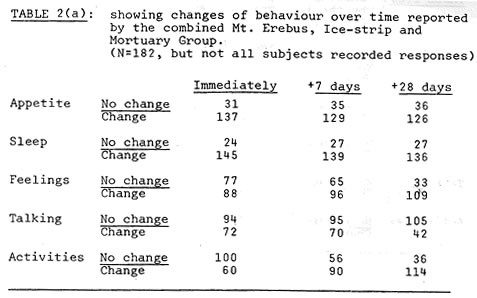
Table from A.J.W. Taylor and A.G. Frazer's report, Psychological sequelae of Operation Overdue following the DC10 aircrash in Antarctica.
The psychological toll
Few of those involved in the recovery and identification of victims from the Erebus disaster could have been truly prepared for the task ahead. As Chief Inspector Jim Morgan, who headed the victim identification phase of Operation Overdue, recalled:
It was very difficult for our young police officers who may have handled the occasional sudden death to be confronted with 280 [sic] sudden deaths all at once. The young married people who were able to go home at the end of their shift and talk about other things, they didn't talk about the horrors of the mortuary, managed to cope quite well, but the young single people who returned to their flats which were largely unoccupied suffered some quite bad psychological trauma. Hear and read this interview.
Psychiatrist Alan Frazier and psychologist Tony Taylor conducted psychological testing and debriefing following the disaster. They subsequently produced Psychological sequelae of Operation Overdue following the DC10 aircrash in Antarctica, a major report on the topic. It established that personnel involved in the gruesome tasks following a disaster were themselves victims of the event. The trauma they suffered meant they deserved specialist support and treatment.
Recognition was given to the post-traumatic stress suffered by those involved in Operation Overdue. Counselling was offered to all who wanted it, and the debriefing report specifically noted the need for officers in command of such operations to know how to recognise and deal with signs of stress in staff. It took several years more for psychological support to become standard practice in the New Zealand Police.
Next page: Recognition
Further information
- The recovery operation - studying the effects (NZALPA's Erebus website)

Community contributions